HRM4821: Deloitte's Strategies for Managing People in the 4IR Era
VerifiedAdded on 2023/06/10
|18
|3901
|406
Report
AI Summary
This report provides an in-depth analysis of Deloitte's workforce management strategies within the context of the 4th Industrial Revolution. It examines Deloitte's business model, strategies for workforce management, and the impact of technological advancements on its operations. The report appraises the professional services sector, highlighting the role of technology and workplace transformation. It further evaluates contemporary management practices, aligning them with CIPD core knowledge areas such as culture, digital working, and people practices. The report also addresses the challenges and opportunities presented by the 4th Industrial Revolution, including its impact on the labor market and potential for increased productivity. Recommendations are provided to enhance Deloitte's workforce strategies, focusing on talent development, diversity, and leadership. The report concludes by emphasizing the importance of adapting to the evolving landscape of the 4th Industrial Revolution to maintain a competitive edge.
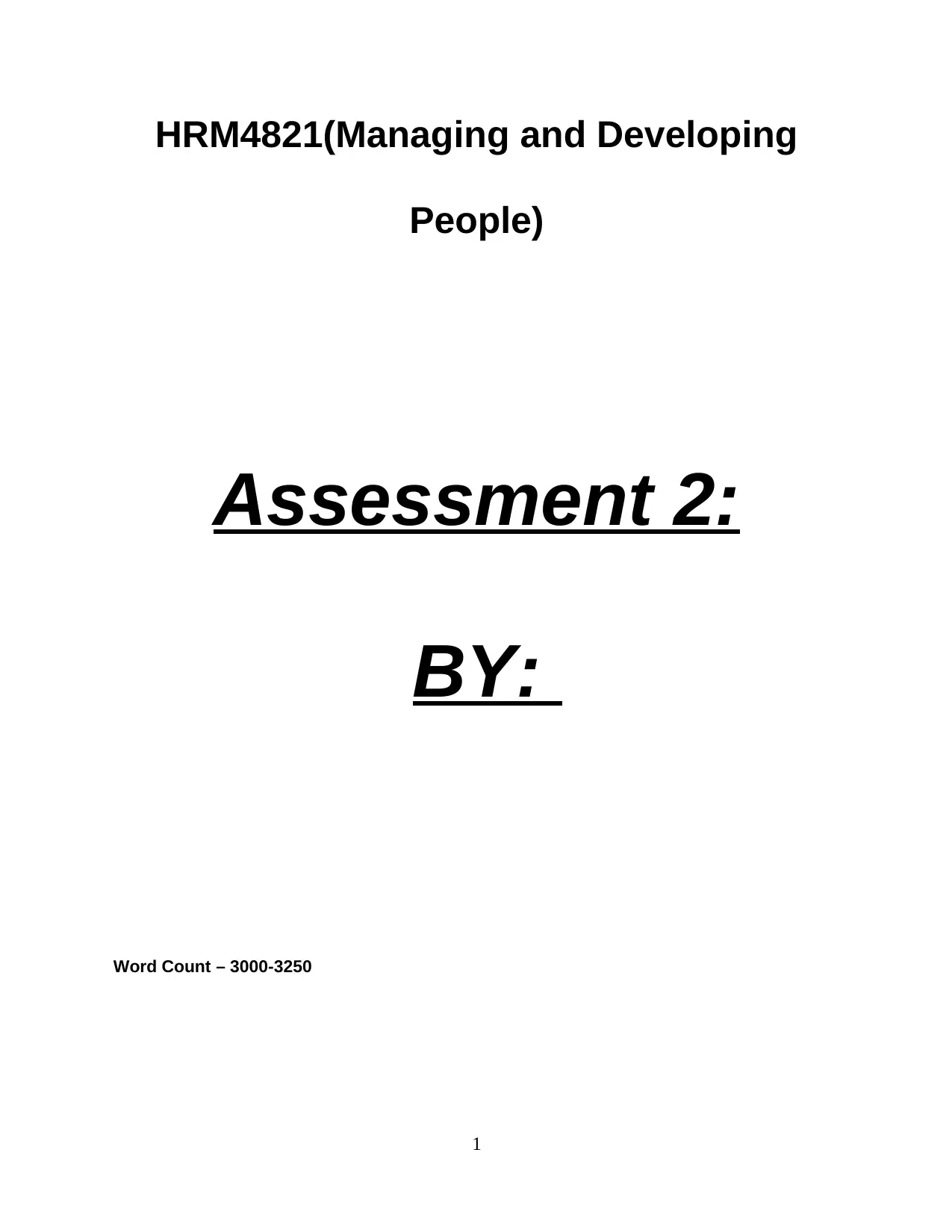
HRM4821(Managing and Developing
People)
Assessment 2:
BY:
Word Count – 3000-3250
1
People)
Assessment 2:
BY:
Word Count – 3000-3250
1
Paraphrase This Document
Need a fresh take? Get an instant paraphrase of this document with our AI Paraphraser

Table of Contents
1.0 Introduction..............................................................................................................................3
2.0 Main body...............................................................................................................................3
2.1 Business model and network of the company..........................................................3
2.2 Business strategy and workforce management......................................................4
2.3 Appraisal of the professional services sector..........................................................5
2.4 Implications of 4th industrial age on workforce and employment..........................6
2.5 Evaluation of Contemporary management of and development of people..........9
2.6 Workforce strategies changed and adapted to the 4th industrial revolution.......11
3.0 Recommendations...............................................................................................................13
4.0 Conclusion.............................................................................................................................15
5.0 References............................................................................................................................16
Books and Journal................................................................................................................16
2
1.0 Introduction..............................................................................................................................3
2.0 Main body...............................................................................................................................3
2.1 Business model and network of the company..........................................................3
2.2 Business strategy and workforce management......................................................4
2.3 Appraisal of the professional services sector..........................................................5
2.4 Implications of 4th industrial age on workforce and employment..........................6
2.5 Evaluation of Contemporary management of and development of people..........9
2.6 Workforce strategies changed and adapted to the 4th industrial revolution.......11
3.0 Recommendations...............................................................................................................13
4.0 Conclusion.............................................................................................................................15
5.0 References............................................................................................................................16
Books and Journal................................................................................................................16
2
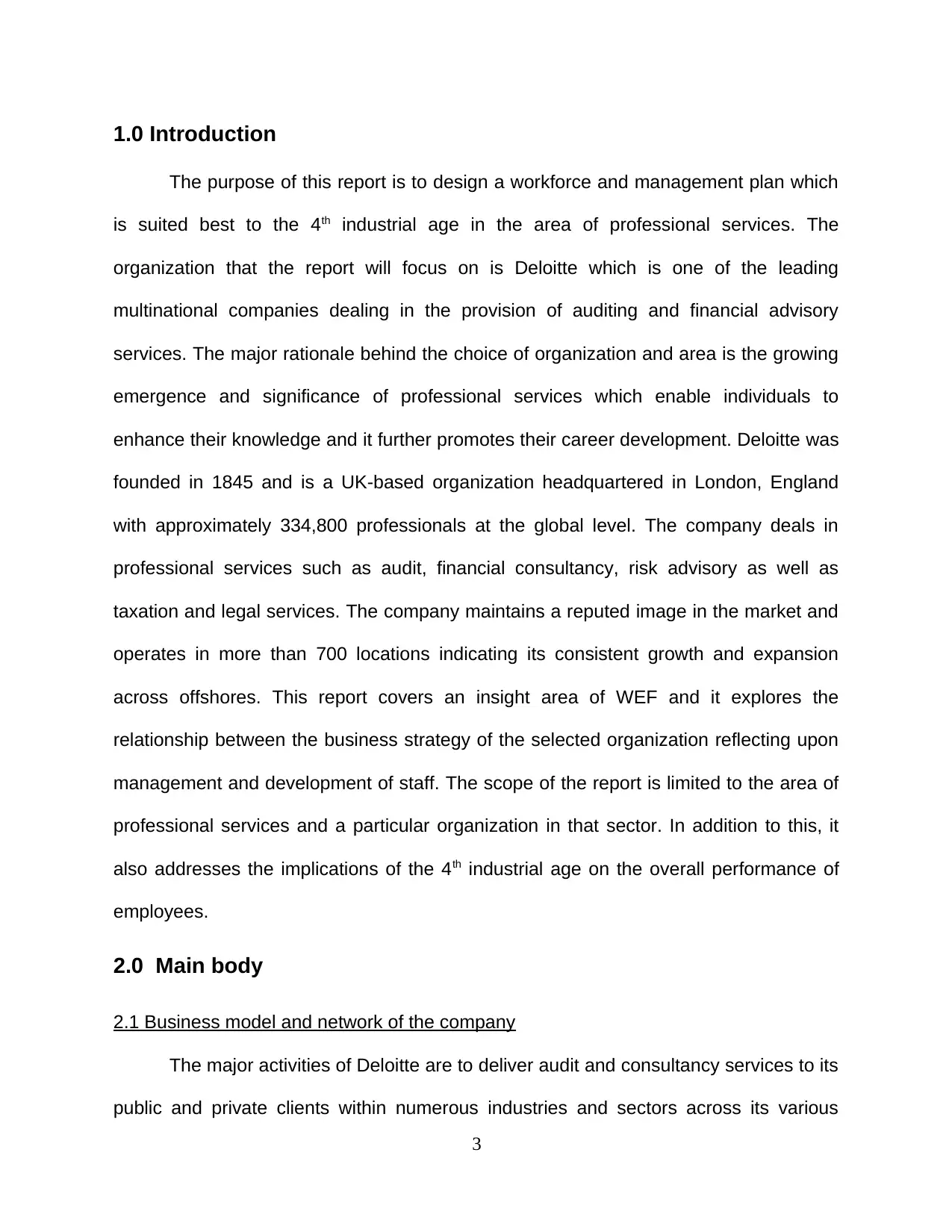
1.0 Introduction
The purpose of this report is to design a workforce and management plan which
is suited best to the 4th industrial age in the area of professional services. The
organization that the report will focus on is Deloitte which is one of the leading
multinational companies dealing in the provision of auditing and financial advisory
services. The major rationale behind the choice of organization and area is the growing
emergence and significance of professional services which enable individuals to
enhance their knowledge and it further promotes their career development. Deloitte was
founded in 1845 and is a UK-based organization headquartered in London, England
with approximately 334,800 professionals at the global level. The company deals in
professional services such as audit, financial consultancy, risk advisory as well as
taxation and legal services. The company maintains a reputed image in the market and
operates in more than 700 locations indicating its consistent growth and expansion
across offshores. This report covers an insight area of WEF and it explores the
relationship between the business strategy of the selected organization reflecting upon
management and development of staff. The scope of the report is limited to the area of
professional services and a particular organization in that sector. In addition to this, it
also addresses the implications of the 4th industrial age on the overall performance of
employees.
2.0 Main body
2.1 Business model and network of the company
The major activities of Deloitte are to deliver audit and consultancy services to its
public and private clients within numerous industries and sectors across its various
3
The purpose of this report is to design a workforce and management plan which
is suited best to the 4th industrial age in the area of professional services. The
organization that the report will focus on is Deloitte which is one of the leading
multinational companies dealing in the provision of auditing and financial advisory
services. The major rationale behind the choice of organization and area is the growing
emergence and significance of professional services which enable individuals to
enhance their knowledge and it further promotes their career development. Deloitte was
founded in 1845 and is a UK-based organization headquartered in London, England
with approximately 334,800 professionals at the global level. The company deals in
professional services such as audit, financial consultancy, risk advisory as well as
taxation and legal services. The company maintains a reputed image in the market and
operates in more than 700 locations indicating its consistent growth and expansion
across offshores. This report covers an insight area of WEF and it explores the
relationship between the business strategy of the selected organization reflecting upon
management and development of staff. The scope of the report is limited to the area of
professional services and a particular organization in that sector. In addition to this, it
also addresses the implications of the 4th industrial age on the overall performance of
employees.
2.0 Main body
2.1 Business model and network of the company
The major activities of Deloitte are to deliver audit and consultancy services to its
public and private clients within numerous industries and sectors across its various
3
⊘ This is a preview!⊘
Do you want full access?
Subscribe today to unlock all pages.

Trusted by 1+ million students worldwide
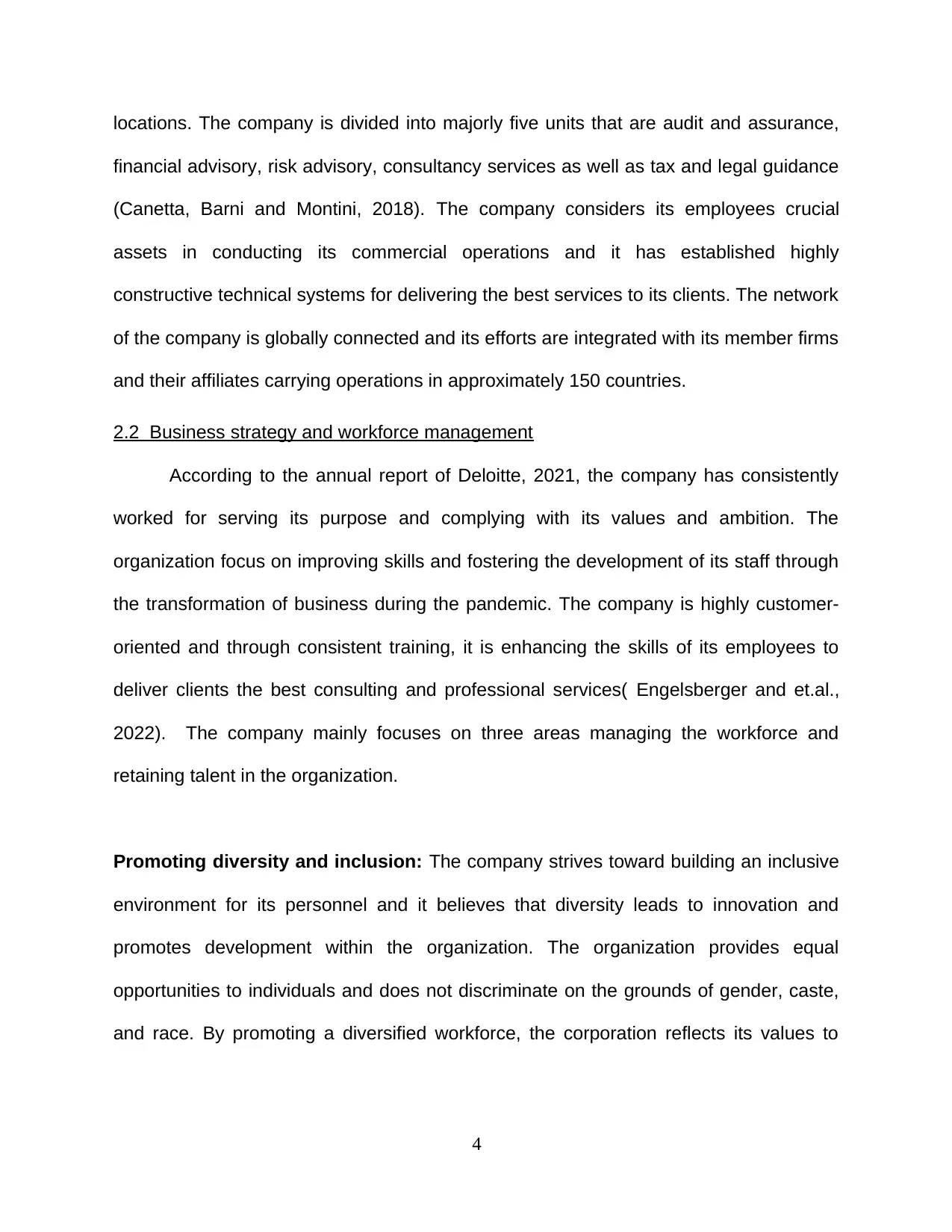
locations. The company is divided into majorly five units that are audit and assurance,
financial advisory, risk advisory, consultancy services as well as tax and legal guidance
(Canetta, Barni and Montini, 2018). The company considers its employees crucial
assets in conducting its commercial operations and it has established highly
constructive technical systems for delivering the best services to its clients. The network
of the company is globally connected and its efforts are integrated with its member firms
and their affiliates carrying operations in approximately 150 countries.
2.2 Business strategy and workforce management
According to the annual report of Deloitte, 2021, the company has consistently
worked for serving its purpose and complying with its values and ambition. The
organization focus on improving skills and fostering the development of its staff through
the transformation of business during the pandemic. The company is highly customer-
oriented and through consistent training, it is enhancing the skills of its employees to
deliver clients the best consulting and professional services( Engelsberger and et.al.,
2022). The company mainly focuses on three areas managing the workforce and
retaining talent in the organization.
Promoting diversity and inclusion: The company strives toward building an inclusive
environment for its personnel and it believes that diversity leads to innovation and
promotes development within the organization. The organization provides equal
opportunities to individuals and does not discriminate on the grounds of gender, caste,
and race. By promoting a diversified workforce, the corporation reflects its values to
4
financial advisory, risk advisory, consultancy services as well as tax and legal guidance
(Canetta, Barni and Montini, 2018). The company considers its employees crucial
assets in conducting its commercial operations and it has established highly
constructive technical systems for delivering the best services to its clients. The network
of the company is globally connected and its efforts are integrated with its member firms
and their affiliates carrying operations in approximately 150 countries.
2.2 Business strategy and workforce management
According to the annual report of Deloitte, 2021, the company has consistently
worked for serving its purpose and complying with its values and ambition. The
organization focus on improving skills and fostering the development of its staff through
the transformation of business during the pandemic. The company is highly customer-
oriented and through consistent training, it is enhancing the skills of its employees to
deliver clients the best consulting and professional services( Engelsberger and et.al.,
2022). The company mainly focuses on three areas managing the workforce and
retaining talent in the organization.
Promoting diversity and inclusion: The company strives toward building an inclusive
environment for its personnel and it believes that diversity leads to innovation and
promotes development within the organization. The organization provides equal
opportunities to individuals and does not discriminate on the grounds of gender, caste,
and race. By promoting a diversified workforce, the corporation reflects its values to
4
Paraphrase This Document
Need a fresh take? Get an instant paraphrase of this document with our AI Paraphraser
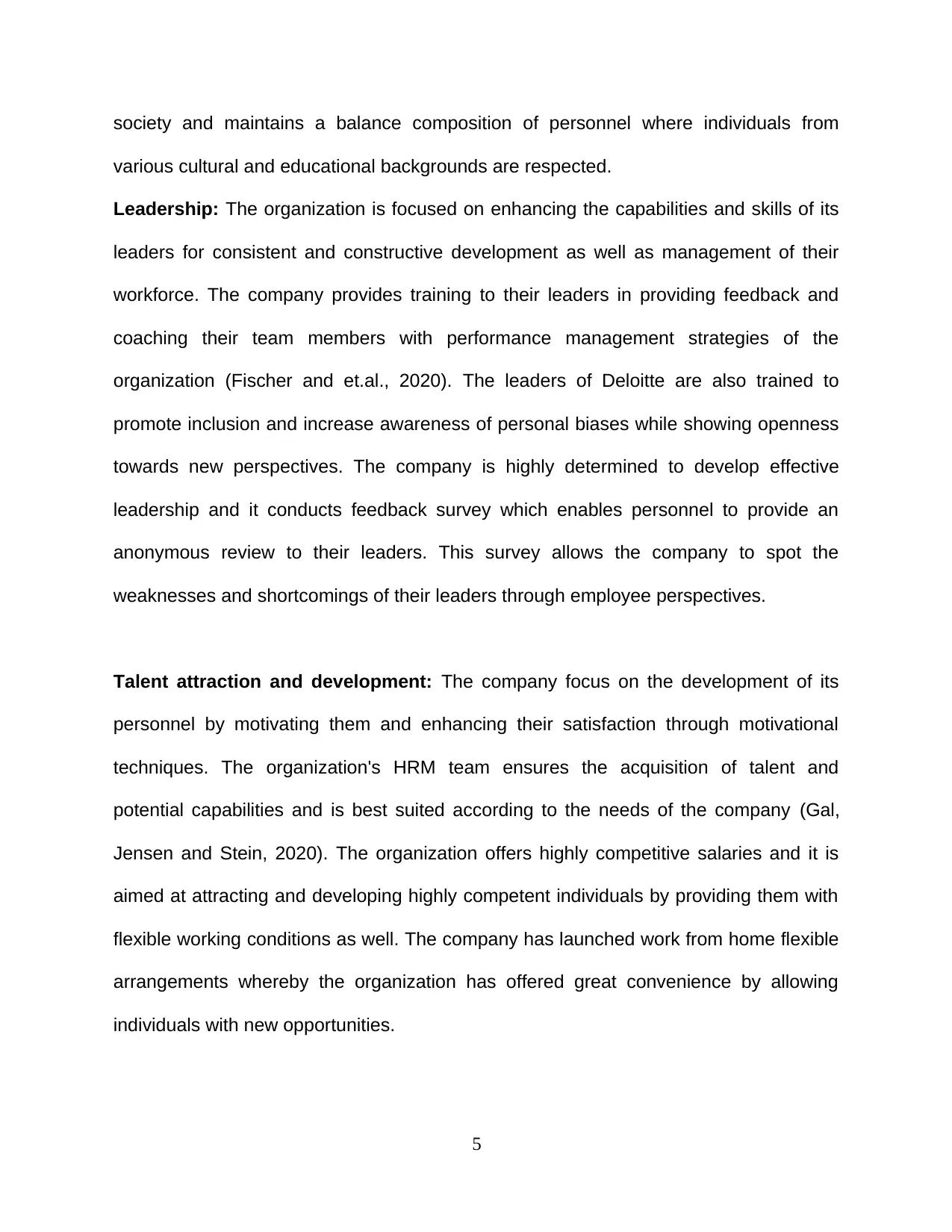
society and maintains a balance composition of personnel where individuals from
various cultural and educational backgrounds are respected.
Leadership: The organization is focused on enhancing the capabilities and skills of its
leaders for consistent and constructive development as well as management of their
workforce. The company provides training to their leaders in providing feedback and
coaching their team members with performance management strategies of the
organization (Fischer and et.al., 2020). The leaders of Deloitte are also trained to
promote inclusion and increase awareness of personal biases while showing openness
towards new perspectives. The company is highly determined to develop effective
leadership and it conducts feedback survey which enables personnel to provide an
anonymous review to their leaders. This survey allows the company to spot the
weaknesses and shortcomings of their leaders through employee perspectives.
Talent attraction and development: The company focus on the development of its
personnel by motivating them and enhancing their satisfaction through motivational
techniques. The organization's HRM team ensures the acquisition of talent and
potential capabilities and is best suited according to the needs of the company (Gal,
Jensen and Stein, 2020). The organization offers highly competitive salaries and it is
aimed at attracting and developing highly competent individuals by providing them with
flexible working conditions as well. The company has launched work from home flexible
arrangements whereby the organization has offered great convenience by allowing
individuals with new opportunities.
5
various cultural and educational backgrounds are respected.
Leadership: The organization is focused on enhancing the capabilities and skills of its
leaders for consistent and constructive development as well as management of their
workforce. The company provides training to their leaders in providing feedback and
coaching their team members with performance management strategies of the
organization (Fischer and et.al., 2020). The leaders of Deloitte are also trained to
promote inclusion and increase awareness of personal biases while showing openness
towards new perspectives. The company is highly determined to develop effective
leadership and it conducts feedback survey which enables personnel to provide an
anonymous review to their leaders. This survey allows the company to spot the
weaknesses and shortcomings of their leaders through employee perspectives.
Talent attraction and development: The company focus on the development of its
personnel by motivating them and enhancing their satisfaction through motivational
techniques. The organization's HRM team ensures the acquisition of talent and
potential capabilities and is best suited according to the needs of the company (Gal,
Jensen and Stein, 2020). The organization offers highly competitive salaries and it is
aimed at attracting and developing highly competent individuals by providing them with
flexible working conditions as well. The company has launched work from home flexible
arrangements whereby the organization has offered great convenience by allowing
individuals with new opportunities.
5
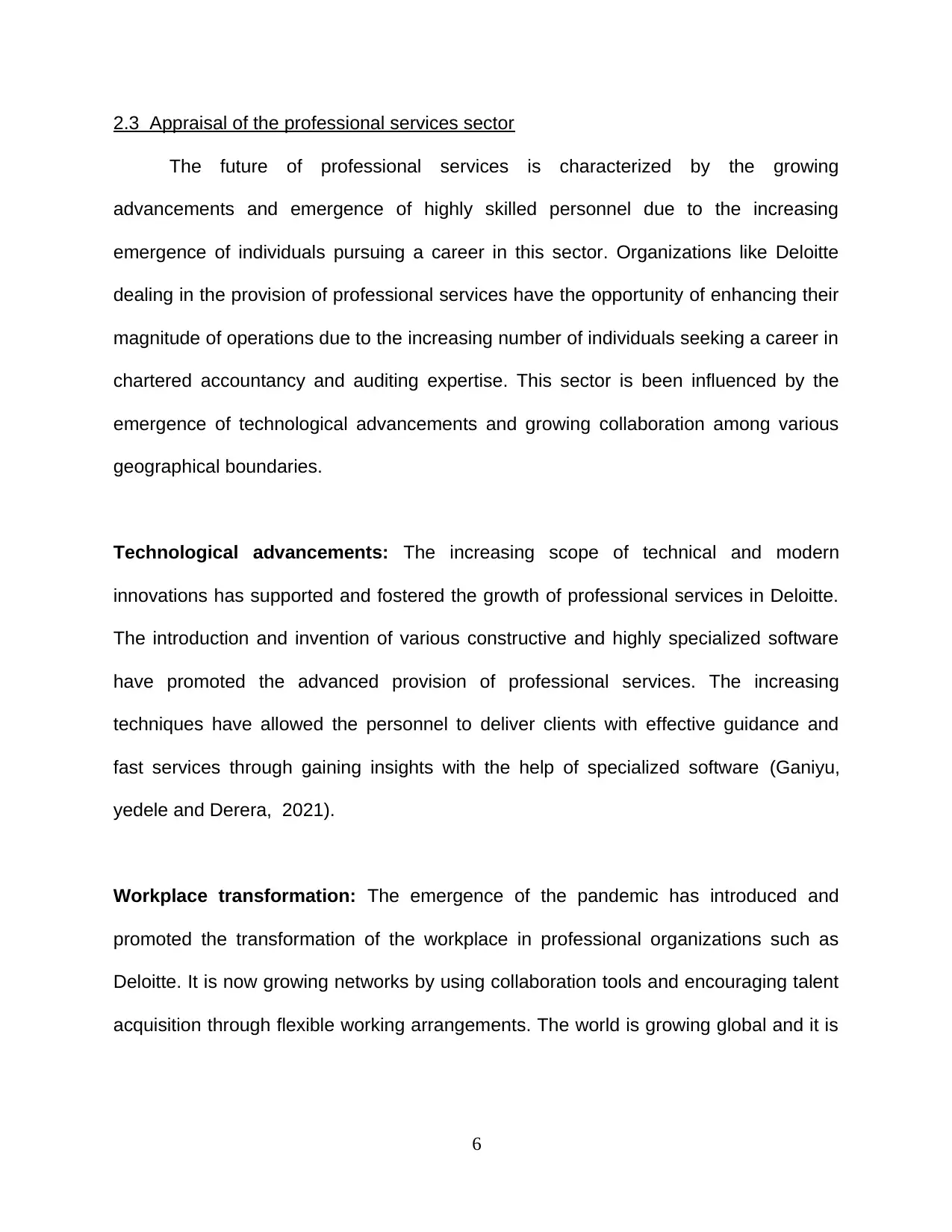
2.3 Appraisal of the professional services sector
The future of professional services is characterized by the growing
advancements and emergence of highly skilled personnel due to the increasing
emergence of individuals pursuing a career in this sector. Organizations like Deloitte
dealing in the provision of professional services have the opportunity of enhancing their
magnitude of operations due to the increasing number of individuals seeking a career in
chartered accountancy and auditing expertise. This sector is been influenced by the
emergence of technological advancements and growing collaboration among various
geographical boundaries.
Technological advancements: The increasing scope of technical and modern
innovations has supported and fostered the growth of professional services in Deloitte.
The introduction and invention of various constructive and highly specialized software
have promoted the advanced provision of professional services. The increasing
techniques have allowed the personnel to deliver clients with effective guidance and
fast services through gaining insights with the help of specialized software (Ganiyu,
yedele and Derera, 2021).
Workplace transformation: The emergence of the pandemic has introduced and
promoted the transformation of the workplace in professional organizations such as
Deloitte. It is now growing networks by using collaboration tools and encouraging talent
acquisition through flexible working arrangements. The world is growing global and it is
6
The future of professional services is characterized by the growing
advancements and emergence of highly skilled personnel due to the increasing
emergence of individuals pursuing a career in this sector. Organizations like Deloitte
dealing in the provision of professional services have the opportunity of enhancing their
magnitude of operations due to the increasing number of individuals seeking a career in
chartered accountancy and auditing expertise. This sector is been influenced by the
emergence of technological advancements and growing collaboration among various
geographical boundaries.
Technological advancements: The increasing scope of technical and modern
innovations has supported and fostered the growth of professional services in Deloitte.
The introduction and invention of various constructive and highly specialized software
have promoted the advanced provision of professional services. The increasing
techniques have allowed the personnel to deliver clients with effective guidance and
fast services through gaining insights with the help of specialized software (Ganiyu,
yedele and Derera, 2021).
Workplace transformation: The emergence of the pandemic has introduced and
promoted the transformation of the workplace in professional organizations such as
Deloitte. It is now growing networks by using collaboration tools and encouraging talent
acquisition through flexible working arrangements. The world is growing global and it is
6
⊘ This is a preview!⊘
Do you want full access?
Subscribe today to unlock all pages.

Trusted by 1+ million students worldwide
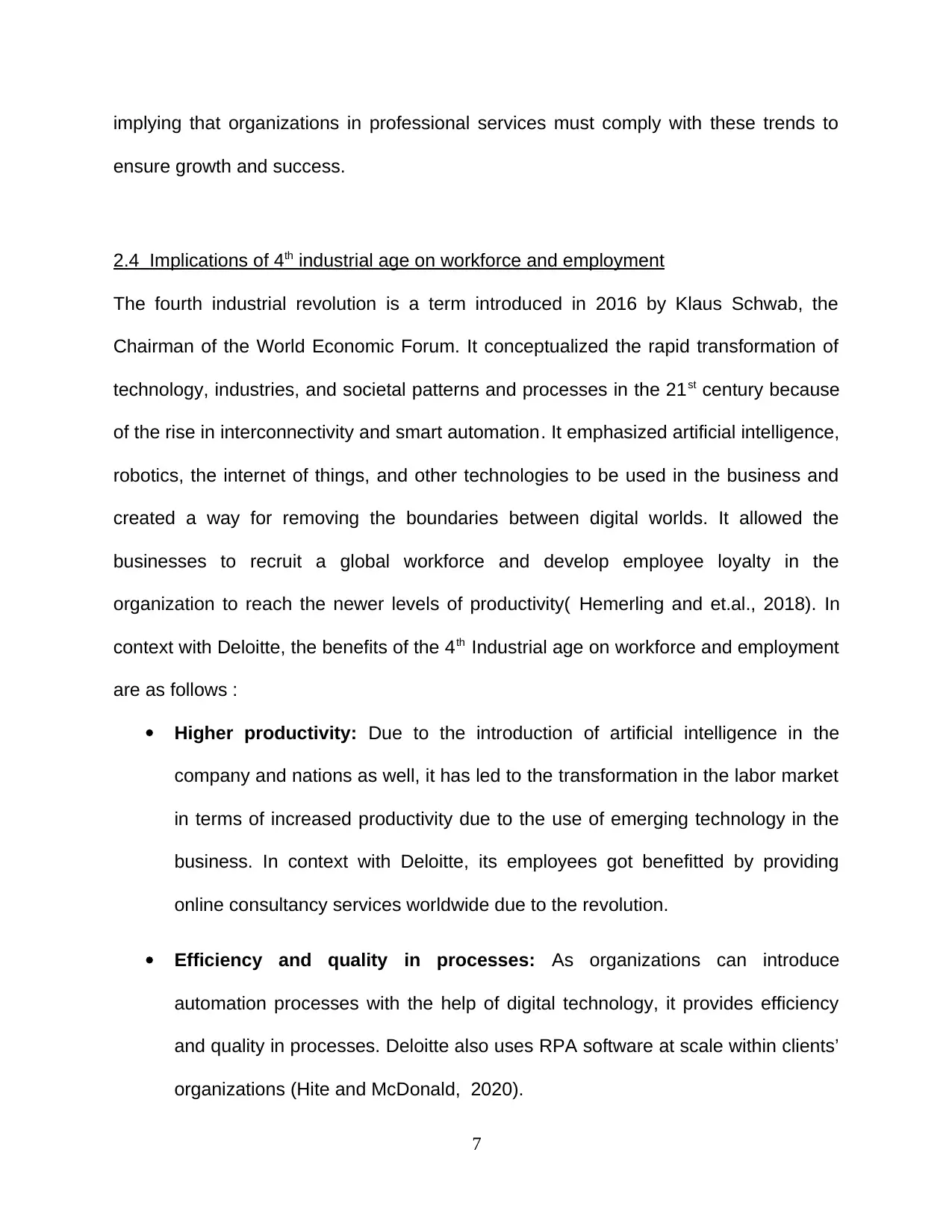
implying that organizations in professional services must comply with these trends to
ensure growth and success.
2.4 Implications of 4th industrial age on workforce and employment
The fourth industrial revolution is a term introduced in 2016 by Klaus Schwab, the
Chairman of the World Economic Forum. It conceptualized the rapid transformation of
technology, industries, and societal patterns and processes in the 21st century because
of the rise in interconnectivity and smart automation. It emphasized artificial intelligence,
robotics, the internet of things, and other technologies to be used in the business and
created a way for removing the boundaries between digital worlds. It allowed the
businesses to recruit a global workforce and develop employee loyalty in the
organization to reach the newer levels of productivity( Hemerling and et.al., 2018). In
context with Deloitte, the benefits of the 4th Industrial age on workforce and employment
are as follows :
Higher productivity: Due to the introduction of artificial intelligence in the
company and nations as well, it has led to the transformation in the labor market
in terms of increased productivity due to the use of emerging technology in the
business. In context with Deloitte, its employees got benefitted by providing
online consultancy services worldwide due to the revolution.
Efficiency and quality in processes: As organizations can introduce
automation processes with the help of digital technology, it provides efficiency
and quality in processes. Deloitte also uses RPA software at scale within clients’
organizations (Hite and McDonald, 2020).
7
ensure growth and success.
2.4 Implications of 4th industrial age on workforce and employment
The fourth industrial revolution is a term introduced in 2016 by Klaus Schwab, the
Chairman of the World Economic Forum. It conceptualized the rapid transformation of
technology, industries, and societal patterns and processes in the 21st century because
of the rise in interconnectivity and smart automation. It emphasized artificial intelligence,
robotics, the internet of things, and other technologies to be used in the business and
created a way for removing the boundaries between digital worlds. It allowed the
businesses to recruit a global workforce and develop employee loyalty in the
organization to reach the newer levels of productivity( Hemerling and et.al., 2018). In
context with Deloitte, the benefits of the 4th Industrial age on workforce and employment
are as follows :
Higher productivity: Due to the introduction of artificial intelligence in the
company and nations as well, it has led to the transformation in the labor market
in terms of increased productivity due to the use of emerging technology in the
business. In context with Deloitte, its employees got benefitted by providing
online consultancy services worldwide due to the revolution.
Efficiency and quality in processes: As organizations can introduce
automation processes with the help of digital technology, it provides efficiency
and quality in processes. Deloitte also uses RPA software at scale within clients’
organizations (Hite and McDonald, 2020).
7
Paraphrase This Document
Need a fresh take? Get an instant paraphrase of this document with our AI Paraphraser
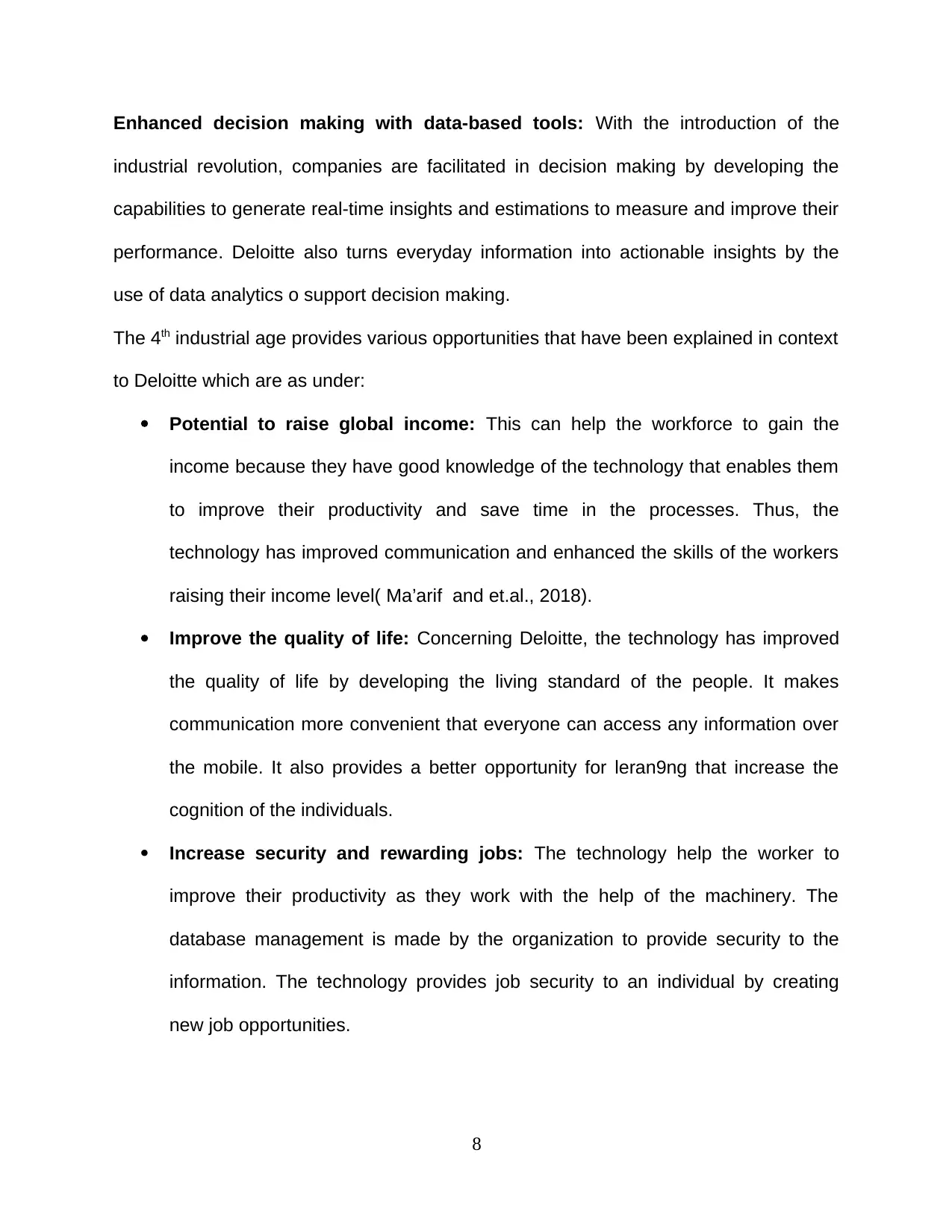
Enhanced decision making with data-based tools: With the introduction of the
industrial revolution, companies are facilitated in decision making by developing the
capabilities to generate real-time insights and estimations to measure and improve their
performance. Deloitte also turns everyday information into actionable insights by the
use of data analytics o support decision making.
The 4th industrial age provides various opportunities that have been explained in context
to Deloitte which are as under:
Potential to raise global income: This can help the workforce to gain the
income because they have good knowledge of the technology that enables them
to improve their productivity and save time in the processes. Thus, the
technology has improved communication and enhanced the skills of the workers
raising their income level( Ma’arif and et.al., 2018).
Improve the quality of life: Concerning Deloitte, the technology has improved
the quality of life by developing the living standard of the people. It makes
communication more convenient that everyone can access any information over
the mobile. It also provides a better opportunity for leran9ng that increase the
cognition of the individuals.
Increase security and rewarding jobs: The technology help the worker to
improve their productivity as they work with the help of the machinery. The
database management is made by the organization to provide security to the
information. The technology provides job security to an individual by creating
new job opportunities.
8
industrial revolution, companies are facilitated in decision making by developing the
capabilities to generate real-time insights and estimations to measure and improve their
performance. Deloitte also turns everyday information into actionable insights by the
use of data analytics o support decision making.
The 4th industrial age provides various opportunities that have been explained in context
to Deloitte which are as under:
Potential to raise global income: This can help the workforce to gain the
income because they have good knowledge of the technology that enables them
to improve their productivity and save time in the processes. Thus, the
technology has improved communication and enhanced the skills of the workers
raising their income level( Ma’arif and et.al., 2018).
Improve the quality of life: Concerning Deloitte, the technology has improved
the quality of life by developing the living standard of the people. It makes
communication more convenient that everyone can access any information over
the mobile. It also provides a better opportunity for leran9ng that increase the
cognition of the individuals.
Increase security and rewarding jobs: The technology help the worker to
improve their productivity as they work with the help of the machinery. The
database management is made by the organization to provide security to the
information. The technology provides job security to an individual by creating
new job opportunities.
8
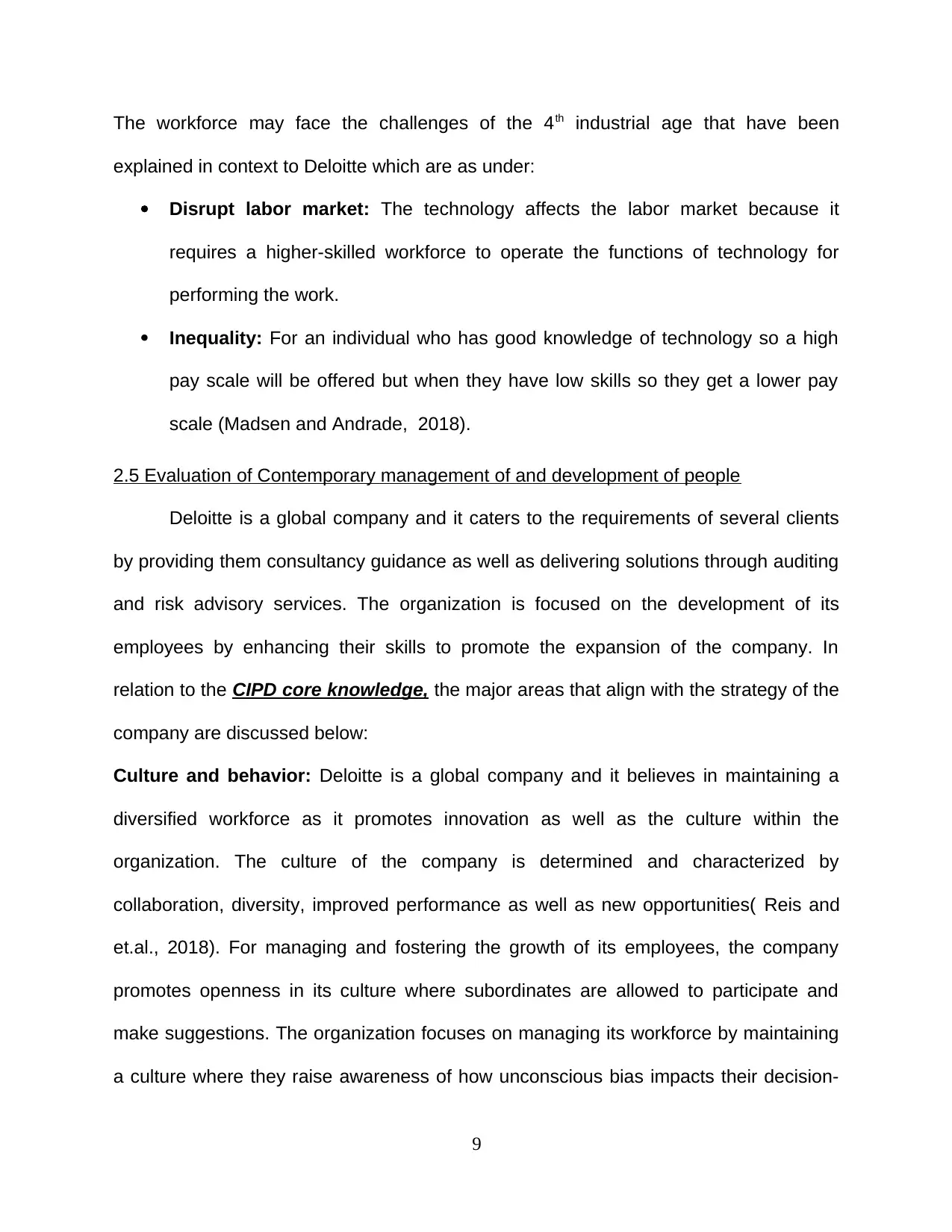
The workforce may face the challenges of the 4th industrial age that have been
explained in context to Deloitte which are as under:
Disrupt labor market: The technology affects the labor market because it
requires a higher-skilled workforce to operate the functions of technology for
performing the work.
Inequality: For an individual who has good knowledge of technology so a high
pay scale will be offered but when they have low skills so they get a lower pay
scale (Madsen and Andrade, 2018).
2.5 Evaluation of Contemporary management of and development of people
Deloitte is a global company and it caters to the requirements of several clients
by providing them consultancy guidance as well as delivering solutions through auditing
and risk advisory services. The organization is focused on the development of its
employees by enhancing their skills to promote the expansion of the company. In
relation to the CIPD core knowledge, the major areas that align with the strategy of the
company are discussed below:
Culture and behavior: Deloitte is a global company and it believes in maintaining a
diversified workforce as it promotes innovation as well as the culture within the
organization. The culture of the company is determined and characterized by
collaboration, diversity, improved performance as well as new opportunities( Reis and
et.al., 2018). For managing and fostering the growth of its employees, the company
promotes openness in its culture where subordinates are allowed to participate and
make suggestions. The organization focuses on managing its workforce by maintaining
a culture where they raise awareness of how unconscious bias impacts their decision-
9
explained in context to Deloitte which are as under:
Disrupt labor market: The technology affects the labor market because it
requires a higher-skilled workforce to operate the functions of technology for
performing the work.
Inequality: For an individual who has good knowledge of technology so a high
pay scale will be offered but when they have low skills so they get a lower pay
scale (Madsen and Andrade, 2018).
2.5 Evaluation of Contemporary management of and development of people
Deloitte is a global company and it caters to the requirements of several clients
by providing them consultancy guidance as well as delivering solutions through auditing
and risk advisory services. The organization is focused on the development of its
employees by enhancing their skills to promote the expansion of the company. In
relation to the CIPD core knowledge, the major areas that align with the strategy of the
company are discussed below:
Culture and behavior: Deloitte is a global company and it believes in maintaining a
diversified workforce as it promotes innovation as well as the culture within the
organization. The culture of the company is determined and characterized by
collaboration, diversity, improved performance as well as new opportunities( Reis and
et.al., 2018). For managing and fostering the growth of its employees, the company
promotes openness in its culture where subordinates are allowed to participate and
make suggestions. The organization focuses on managing its workforce by maintaining
a culture where they raise awareness of how unconscious bias impacts their decision-
9
⊘ This is a preview!⊘
Do you want full access?
Subscribe today to unlock all pages.

Trusted by 1+ million students worldwide
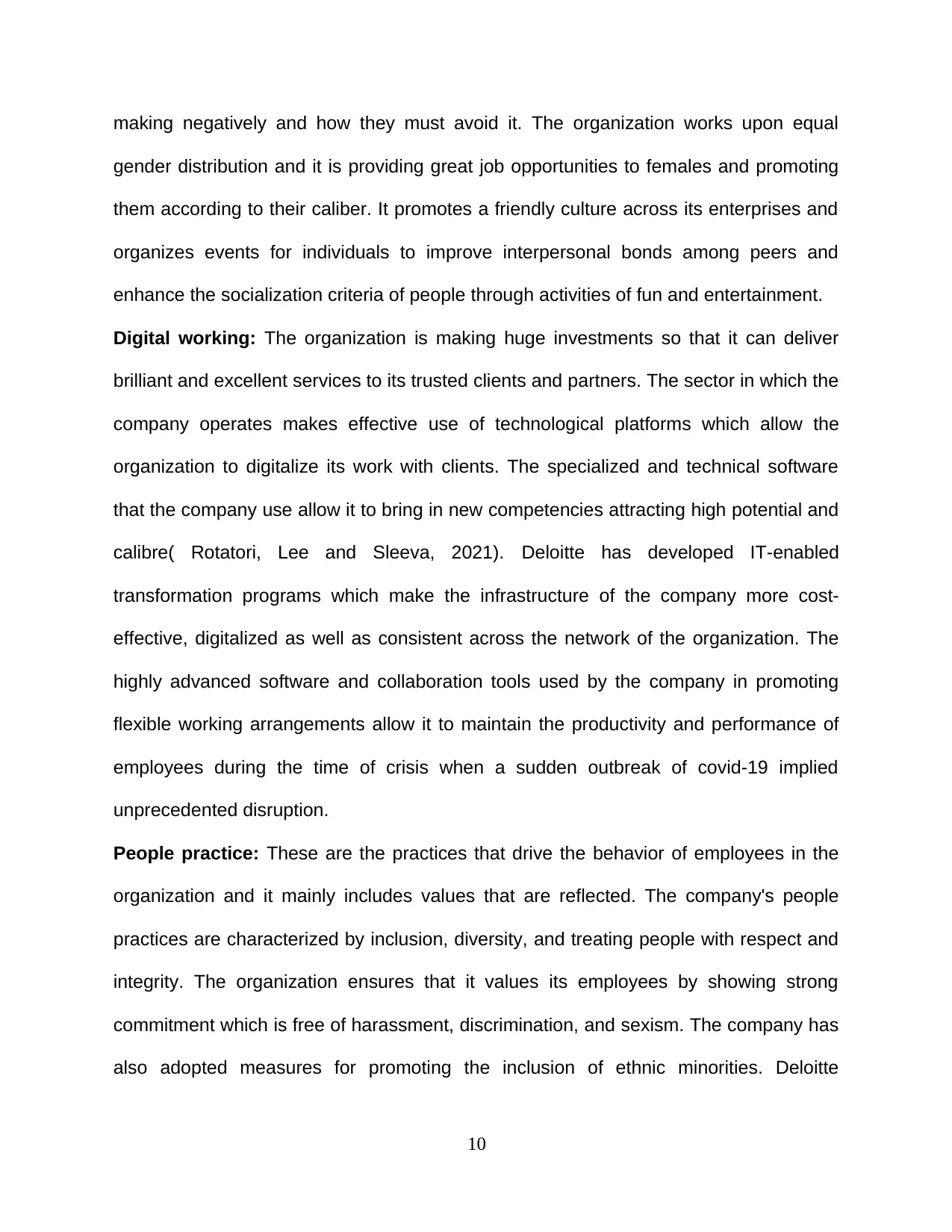
making negatively and how they must avoid it. The organization works upon equal
gender distribution and it is providing great job opportunities to females and promoting
them according to their caliber. It promotes a friendly culture across its enterprises and
organizes events for individuals to improve interpersonal bonds among peers and
enhance the socialization criteria of people through activities of fun and entertainment.
Digital working: The organization is making huge investments so that it can deliver
brilliant and excellent services to its trusted clients and partners. The sector in which the
company operates makes effective use of technological platforms which allow the
organization to digitalize its work with clients. The specialized and technical software
that the company use allow it to bring in new competencies attracting high potential and
calibre( Rotatori, Lee and Sleeva, 2021). Deloitte has developed IT-enabled
transformation programs which make the infrastructure of the company more cost-
effective, digitalized as well as consistent across the network of the organization. The
highly advanced software and collaboration tools used by the company in promoting
flexible working arrangements allow it to maintain the productivity and performance of
employees during the time of crisis when a sudden outbreak of covid-19 implied
unprecedented disruption.
People practice: These are the practices that drive the behavior of employees in the
organization and it mainly includes values that are reflected. The company's people
practices are characterized by inclusion, diversity, and treating people with respect and
integrity. The organization ensures that it values its employees by showing strong
commitment which is free of harassment, discrimination, and sexism. The company has
also adopted measures for promoting the inclusion of ethnic minorities. Deloitte
10
gender distribution and it is providing great job opportunities to females and promoting
them according to their caliber. It promotes a friendly culture across its enterprises and
organizes events for individuals to improve interpersonal bonds among peers and
enhance the socialization criteria of people through activities of fun and entertainment.
Digital working: The organization is making huge investments so that it can deliver
brilliant and excellent services to its trusted clients and partners. The sector in which the
company operates makes effective use of technological platforms which allow the
organization to digitalize its work with clients. The specialized and technical software
that the company use allow it to bring in new competencies attracting high potential and
calibre( Rotatori, Lee and Sleeva, 2021). Deloitte has developed IT-enabled
transformation programs which make the infrastructure of the company more cost-
effective, digitalized as well as consistent across the network of the organization. The
highly advanced software and collaboration tools used by the company in promoting
flexible working arrangements allow it to maintain the productivity and performance of
employees during the time of crisis when a sudden outbreak of covid-19 implied
unprecedented disruption.
People practice: These are the practices that drive the behavior of employees in the
organization and it mainly includes values that are reflected. The company's people
practices are characterized by inclusion, diversity, and treating people with respect and
integrity. The organization ensures that it values its employees by showing strong
commitment which is free of harassment, discrimination, and sexism. The company has
also adopted measures for promoting the inclusion of ethnic minorities. Deloitte
10
Paraphrase This Document
Need a fresh take? Get an instant paraphrase of this document with our AI Paraphraser
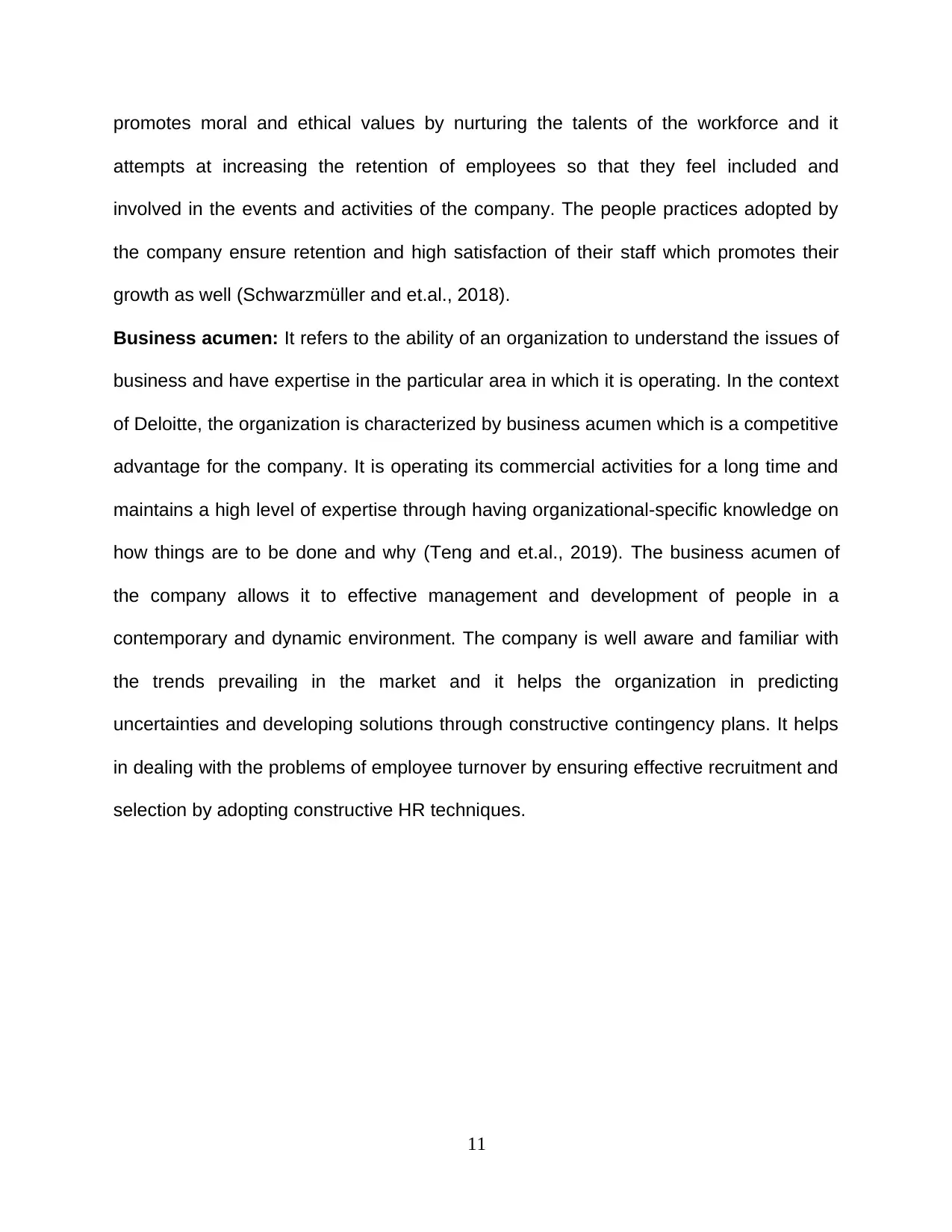
promotes moral and ethical values by nurturing the talents of the workforce and it
attempts at increasing the retention of employees so that they feel included and
involved in the events and activities of the company. The people practices adopted by
the company ensure retention and high satisfaction of their staff which promotes their
growth as well (Schwarzmüller and et.al., 2018).
Business acumen: It refers to the ability of an organization to understand the issues of
business and have expertise in the particular area in which it is operating. In the context
of Deloitte, the organization is characterized by business acumen which is a competitive
advantage for the company. It is operating its commercial activities for a long time and
maintains a high level of expertise through having organizational-specific knowledge on
how things are to be done and why (Teng and et.al., 2019). The business acumen of
the company allows it to effective management and development of people in a
contemporary and dynamic environment. The company is well aware and familiar with
the trends prevailing in the market and it helps the organization in predicting
uncertainties and developing solutions through constructive contingency plans. It helps
in dealing with the problems of employee turnover by ensuring effective recruitment and
selection by adopting constructive HR techniques.
11
attempts at increasing the retention of employees so that they feel included and
involved in the events and activities of the company. The people practices adopted by
the company ensure retention and high satisfaction of their staff which promotes their
growth as well (Schwarzmüller and et.al., 2018).
Business acumen: It refers to the ability of an organization to understand the issues of
business and have expertise in the particular area in which it is operating. In the context
of Deloitte, the organization is characterized by business acumen which is a competitive
advantage for the company. It is operating its commercial activities for a long time and
maintains a high level of expertise through having organizational-specific knowledge on
how things are to be done and why (Teng and et.al., 2019). The business acumen of
the company allows it to effective management and development of people in a
contemporary and dynamic environment. The company is well aware and familiar with
the trends prevailing in the market and it helps the organization in predicting
uncertainties and developing solutions through constructive contingency plans. It helps
in dealing with the problems of employee turnover by ensuring effective recruitment and
selection by adopting constructive HR techniques.
11
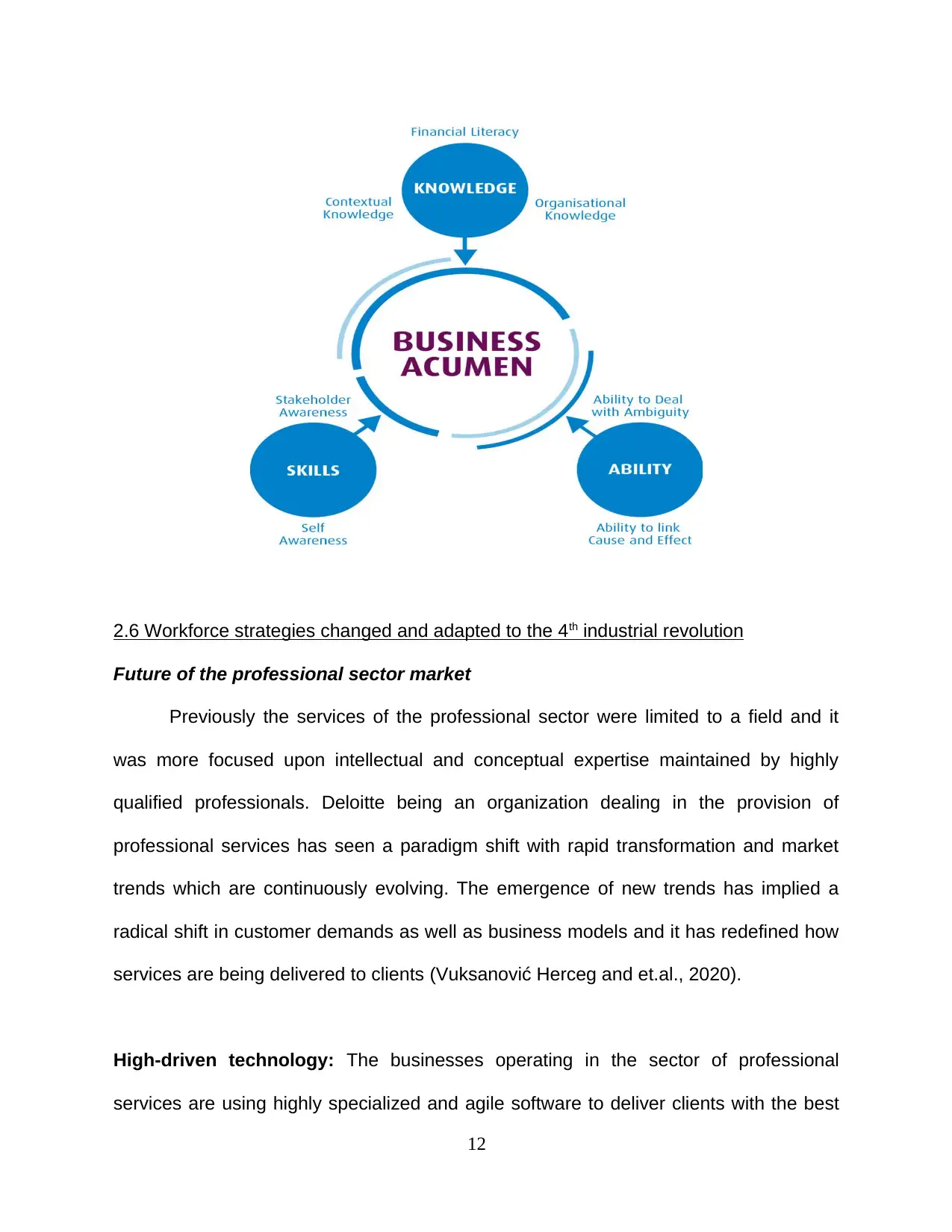
2.6 Workforce strategies changed and adapted to the 4th industrial revolution
Future of the professional sector market
Previously the services of the professional sector were limited to a field and it
was more focused upon intellectual and conceptual expertise maintained by highly
qualified professionals. Deloitte being an organization dealing in the provision of
professional services has seen a paradigm shift with rapid transformation and market
trends which are continuously evolving. The emergence of new trends has implied a
radical shift in customer demands as well as business models and it has redefined how
services are being delivered to clients (Vuksanović Herceg and et.al., 2020).
High-driven technology: The businesses operating in the sector of professional
services are using highly specialized and agile software to deliver clients with the best
12
Future of the professional sector market
Previously the services of the professional sector were limited to a field and it
was more focused upon intellectual and conceptual expertise maintained by highly
qualified professionals. Deloitte being an organization dealing in the provision of
professional services has seen a paradigm shift with rapid transformation and market
trends which are continuously evolving. The emergence of new trends has implied a
radical shift in customer demands as well as business models and it has redefined how
services are being delivered to clients (Vuksanović Herceg and et.al., 2020).
High-driven technology: The businesses operating in the sector of professional
services are using highly specialized and agile software to deliver clients with the best
12
⊘ This is a preview!⊘
Do you want full access?
Subscribe today to unlock all pages.

Trusted by 1+ million students worldwide
1 out of 18
Related Documents
Your All-in-One AI-Powered Toolkit for Academic Success.
+13062052269
info@desklib.com
Available 24*7 on WhatsApp / Email
![[object Object]](/_next/static/media/star-bottom.7253800d.svg)
Unlock your academic potential
Copyright © 2020–2026 A2Z Services. All Rights Reserved. Developed and managed by ZUCOL.





